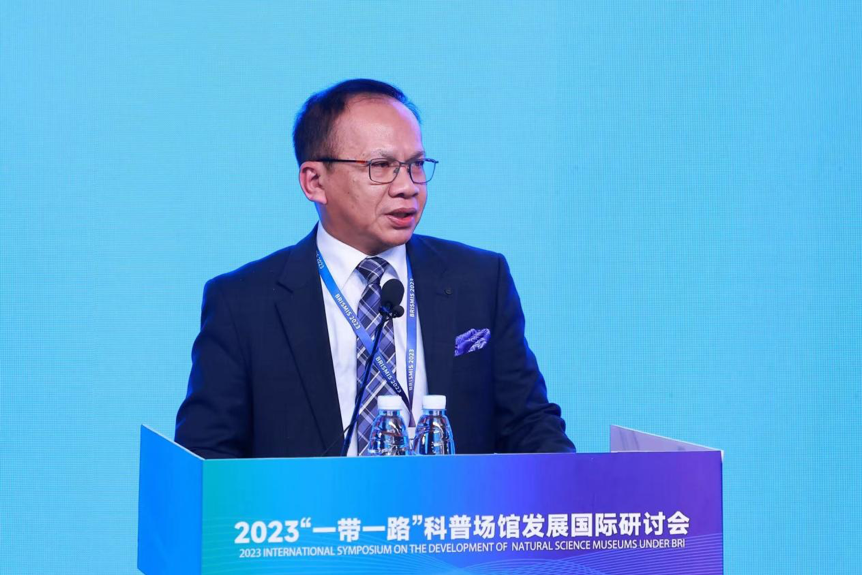Making Science Coherent to Wider Audiences

Dr. Yoslan Nur. (COURTESY PHOTO)
By?Emma
Recently, an Indonesian expert on scientific assessment and policy, Yoslan Nur, also an officer of the United Nations Educational, Scientific and Cultural Organization (UNESCO), visited Beijing for the 2023 International Symposium on the Development of Natural Science Museums under the Belt and Road Initiative (BRI).
During the symposium, he called for more initiatives to utilize the science museums and centers to "make science more engaging and accessible to a broader audience."
Establishing platforms for knowledge communication
Nur embarked on his journey with UNESCO in 1999, laying a solid foundation for a remarkable career devoted to promoting a culture of innovation and science communication for sustainable development. He has played a pivotal role in advancing the development of science centers and museums around the world, especially in Africa.
According to Nur, science centers and museums serve as vital platforms for knowledge exchange, providing an enjoyable way for children to gain knowledge in the sci-tech field.
Moreover, these facilities are quite important in enhancing public awareness regarding sustainable development. To some extent, they can encourage individuals and groups to reflect on their actions, contributing to the collective effort in addressing global issues like climate change and the loss of biodiversity.
From Nur's perspective, the development of the natural science museums under the BRI holds immense value in fostering cultural exchange and driving technological innovation through education and awareness initiatives.
However, the process has not been without its challenges. Nur acknowledged the limited presence of science centers in Africa in general. Currently, science centers in Africa are primarily concentrated in the southern or northern regions. He advised that initiatives, like promoting "scientific tourism," could make technology more present on the continent.
Working together for science outreach
As the saying goes, "If you want to go fast, go alone; if you want to go far, go together." Nur said UNESCO does not improve public understanding in the sci-tech field alone, rather reaching out to form a cooperative network to make collective efforts. He applauded China's role in enhancing global science outreach activities at different levels.
In 2018, the Chinese Association of Natural Science Museums (CANSM) and UNESCO agreed to work together on new activities to unleash the potential of science-oriented museums to promote the United Nations Sustainable Development Goals.
For instance, CANSM has actively supported UNESCO's work, fostering collaborative efforts to promote science popularization under the BRI framework, which includes capacity-building programs for science museums and contributions to science popularization policy-making.
At the same time, Nur mentioned the China-aided science museum in Addis Ababa, the Ethiopian capital, which is said to be Africa's first-ever museum solely dedicated to science.
He said it has become a crucial asset, fostering scientific awareness and education among the local people. These efforts by the Chinese government have had a profoundly positive impact on the region, creating a substantial influence.
Recognizing the success of the science museum in Ethiopia, there is hope for similar initiatives in Kenya or Rwanda. The establishment of science centers in these regions could further improve public understanding of science and contribute to local development.
Fueling sci-tech innovation
Nur is quite familiar with China's journey towards becoming a sci-tech powerhouse. He never hesitates to share his thoughts to help the public understand China's sci-tech policies.
In the dynamic landscape of global scientific advancement, China has emerged as a powerhouse, attracting attention for its efforts to foster international cooperation in the scientific field.
"He is an old friend to Chinese people and China," said Ou Jiancheng, his Chinese counterpart working at the CANSM. Nur said in a recent interview with Science and Technology Daily that China? has transitioned from a manufacturing hub to a provider of cutting-edge technologies such as high-speed trains, and smartphones.
The catalyst for this evolution lies in the establishment of organizations like the Chinese Academy of Sciences and the Ministry of Science and Technology, with their cohesive functions in sci-tech policy making and implementation.
"Technological innovation is like an engine," said Nur. "A country needs to continually fuel the engine to keep it in motion. Once the engine of scientific innovation starts running, it propels economic development, social progress, and cultural advancement in various aspects."
China's role in global innovation culture is not confined to technological capacity alone. He lauded China's strategic deployment of high-tech zones, sci-tech incubators in universities, and support for small and medium enterprises (SMEs) in fostering a knowledge-driven economy.
"I think that China is doing well in developing the knowledge economy and knowledge society," said Nur.






